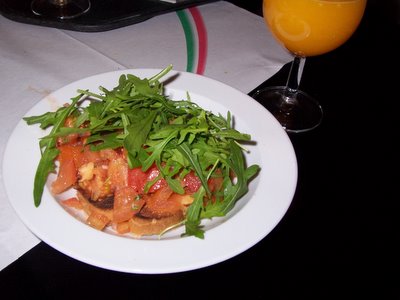Friday, February 17, 2006
Wednesday, February 15, 2006
Bruschetta

"Bruschetta, A Tuscan dish designed to show off the new season's oil at the time of the olive harvest."
---Oxford Companion to Food, Alan Davidson [Oxford University Press:Oxford] 1999 (p. 110)
"Bruschetta. Toasted bread, often rubbed with garlic and drizzled with olive oil. Also schiena d'asino, soma d'aj in the south, and fettunta in Tuscany. Bruschetta has always been a way to salvage bread that was going stale by adding oil and seasonings. Sometimes the bread is entirely immersed in oil, but usually the oil is poured on the top after the bread is rubbed with a garlic clove. In recent years adding toppings, particularly chopped onions and tomatoes, has become popular in restaurants."
---The Dictionary of Italian Food and Drink, John Mariani [Broadway Books:New York] 1998 (p. 45)
Tuesday, February 14, 2006
Croissants

"Croissant...This delicious pastry originated in Budapest in 1686, when the Turks were besieging the city. To reach the centre of the town, they dug underground passages. Bakers, working during the night, heard the noise made by the Turks and gave the alarm. The assailants were repulsed and the bakers who had saved the city were granted the privilege of making a special pastry which had to take the form of a crescent in memory of the emblem on the Ottoman flag."
---Larousse Gastronomique, Jenifer Harvey Lang, editor [Crown:New York] 1988 (p. 338)
"Culinary mythology--origin of the croissant
According to one of a group of similar legends, which vary only in detail, a baker of the 17th century, working through the night at a time when his city (either Vienna in 1683 or Budapest in 1686) was under siege by the Turks, heard faint underground rumbling sounds which, on investigation, proved to be caused by a Turkish attempt to invade the city by tunnelling under the walls. The tunnel was blown up. The baker asked no reward other than the exclusive right to bake crescent-shaped pastries commemorating the incident, the crescent being the sympol of Islam. He was duly rewarded in this way, and the croissant was born. The story seems to owe its origin, or at least its wide diffusion, to Alfred Gottschalk, who wrote about the croissant for the first edition of the Larousse Gastronomique [1938] and there gave the legend in the Turkish attack on Budapest in 1686 version; but on the history of food, opted for the 'siege of Vienna in 1683' version."
---Oxford Companion to Food, Alan Davidson [Oxford Companion to Food:Oxford] 1999 (p. 232)
"[The] croissant in its present form does not have a long history...The earliest French reference to the croissant seems to be in Payen's book "Des substances alimentaires," published in 1853. He cites, among the "Pains dit de fantasie ou de luxe," not only English 'muffins' but 'les croissants'. The term appears again, ten years later, in the great Littre dictionary [1863] where it is defined as 'a little crescent-shaped bread or cake'. Thirteen years later, Husson in "Les Consommations de Paris" [1875] includes 'croissants for coffee' in a list of 'ordinary' (as opposed to 'fine') pastry goods. Yet no trace of a recipe for croissants can be found earlier than that given by Favre in his Dictionnaire universel de cuisine [c. 1905], and his recipe bears no resemblance to the modern puff pastry concoction; it is rather an oriental pastry made of pounded almonds and sugar. Only in 1906, in Colombie's Nouvelle Encyclopedie culinaire, did a true croissant, and its development into a national symbol of France, is a 20th-century history."
---Oxford Companion to Food (p. 228)









